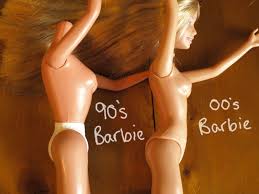When reading about the idea of the Disney Princess hype I was struggling to wonder why I did not fall victim into that phase. Being a child of the 1980's, I knew what Disney movies/characters were, but had no desire to watch Disney movies or be that kid who wished to go to
Disneyland. When reading this excerpt, I genuinely felt sorry for the children who base their play around the fantasy princess. I was relived with the fact that research has suggested that playing princess does not damage self esteem or dampens aspirations among young girls. The thoughts that came to my mind were all of my 30 something year old friends on Facebook who are mothers of yong daughters idolizing them and placing a picture of their daughter dressed as a princess or in some Disney attire and making it be their profile picture. Also, those same mothers creating a photo album on Facebook with tehir daughters dressed as princesses in strollers with the caption, "Lexie is counting down the days for our trip to Disney." Personally, I found that I agreed with the author. It was reassuring to hear about another mother the author mentions who allows her daughter to know who certain characters are from Disney, but she doesn't allow her daughter to know the failry tale aspect of Disney characters.

This excerpt reinforced some main ideas from a previous reading in the GEND 364/550 class validating what Christensen claimed about media's hidden messages about gender identification. Going back to this reading, Christensen stated, "Children's cartoons, movies and literature are perhaps the most influential genre "read." Also when referring to Cinderella and other fairy tale role models, Christensen states, "Cinderella is to get her man. Both young women are transformed and made beautiful through new clothes, new jewels, and new hairstyles." This is parallel to Orenstein's mentioning of how mainstream media emphasizes the importance of females to be pretty and sexy. She also explains how teens and college girls who hold conventional beliefs (such as believing the subliminal messages Christensen claims Disney gives to young girls about their roles in society as a female) are less ambitious, more likely to be depressed, less likely to enjoy sex or insist a partner to use
condoms.
As a child, I did not have any interest in baby dolls, Disney or Cabbage Patch Dolls, however, I was a Barbie girl! Reading Orenstein's analysis of what Barbie represented helped me to understand why I didn't fall into the princess or being a mom fantasy. Growing up, I did not want to be the dependent person I saw my mom being. Instead, I was focused on being the first person in my family to graduate high school and college and to obtain a career that would build my independence. This is what Barbie represented! As Orenstein put it,
Barbie was childless, had casual dates with Ken, she had careers and represented an independent woman hood. This was attractive to me. I did not play "Barbie goes to the mall." I was very realistic. My Barbies lived in a house full of furniture and a BMW and a Ferrari, went to work and dated multiple Ken dolls. I was content dressing up barbie for dates, coloring her blonde hair with red, blue, green and yellow food dye. She also boasted ear cartilage piercings where I stapled the top part of her ear to look like a bar piercing. I also used a push pin from my mom's sewing kit as a nose ring. I added pen or Sharpie to her eyes for intense eye liner. My Barbie represented an independent woman who expressed her self in different ways. This is why Barbie was my doll.
My question relating to this article is how did Barbie lose popularity when her representation was so empowering for young girls? I realize in the reading, Brats took over representing adolescent attitude and fashion statements. Again, this shows the need of little girls to live in this unrealistic fantasy world that there is biased importance in fashion, motherhood and being a wife. Barbie allows a child to use their imagination. Perhaps the problem is Barbie is too independent and young girls are not taught or led by example of what independence is. Rather, it appears to be much easier to play mommy or the princess rescued by a prince.

